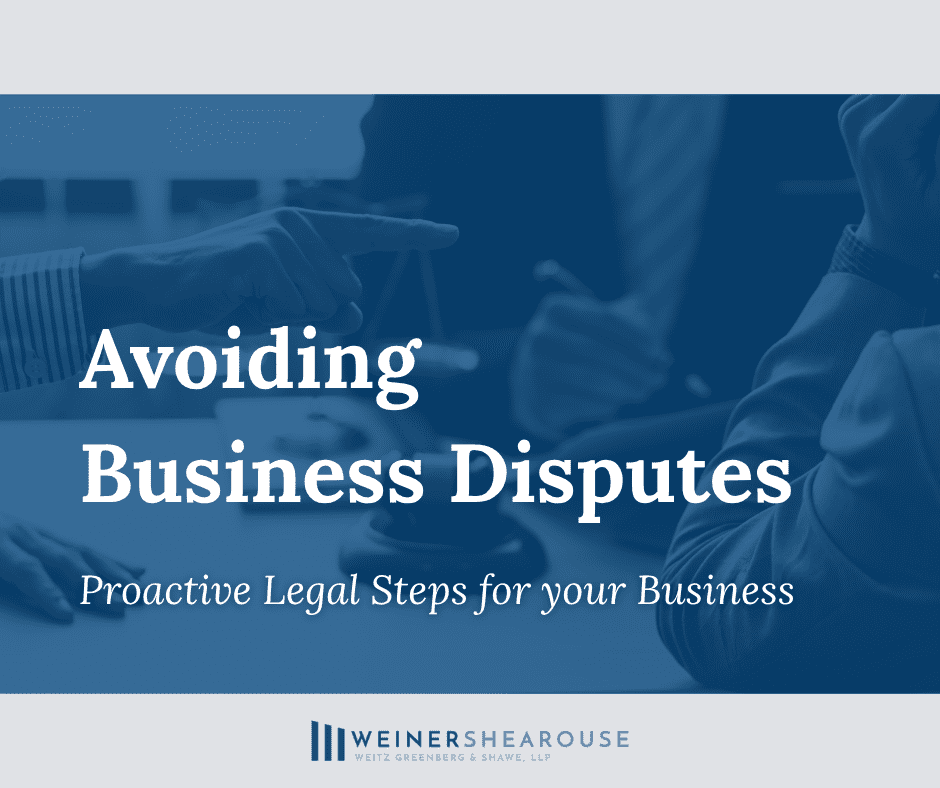In the world of business, disputes can feel inevitable. From disagreements with partners to conflicts with clients or employees, these challenges can be incredibly costly, draining both financial resources and valuable time. Beyond the immediate expense, business disputes can damage your company’s reputation and disrupt operations, diverting focus from growth and innovation.
Many common business disputes are preventable. By taking proactive legal steps, you can significantly minimize your risk and safeguard your company’s future. This article outlines key strategies to help your business avoid costly conflicts and maintain smooth operations.
Foundational Legal Safeguards
Just as a strong foundation is crucial for any building, solid legal safeguards are essential for a resilient business.
- Clear & Comprehensive Contracts: Your contracts are your first line of defense. Well-drafted agreements don’t just formalize relationships; they clarify expectations, define responsibilities, and, most importantly, provide a roadmap for resolving issues before they escalate.
- Importance: They prevent misunderstandings and provide a legal basis for enforcement.
- Key Elements: Ensure your contracts include specificity in terms, clear scope of work, detailed payment schedules, well-defined termination clauses, and predetermined dispute resolution mechanisms (like mediation or arbitration).
- Types: This applies to all agreements: client/customer contracts, vendor agreements, partnership agreements, and employment contracts.
- Choosing the Right Business Entity: The legal structure of your business has significant implications for liability and internal governance.
- Legal Protection: Entities like Limited Liability Companies (LLCs) or Corporations can shield your personal assets from business debts and disputes.
- Governance: Beyond liability, clearly defined bylaws (for corporations) or operating agreements (for LLCs) are vital. These documents establish clear internal rules, roles, and decision-making processes, which are critical for preventing internal conflicts among partners or shareholders.
- Protecting Intellectual Property (IP): Your intellectual property—the unique creations of your business—is a valuable asset and a frequent source of disputes if not properly protected.
- Assets: This includes trademarks (your brand name, logo), copyrights (creative works), trade secrets (confidential business information), and patents (inventions).
- Prevention: Proactively register your key IP assets where applicable. Implement robust non-disclosure agreements (NDAs) with employees and external parties. Ensure intellectual property assignment agreements are in place with employees and contractors, clarifying who owns the work created for your business.
Proactive Steps in Business Operations
Beyond foundational legal structures, day-to-day operational practices play a significant role in dispute prevention.
- Robust Employment Practices: Employees are the backbone of your business, and clear employment practices can prevent misunderstandings and legal challenges.
- Clear Policies: Develop comprehensive employee handbooks, clear codes of conduct, and robust anti-discrimination and harassment policies.
- Documentation: Maintain meticulous records of performance reviews, disciplinary actions, and termination procedures.
- Training: Conduct regular training sessions on workplace harassment, ethics, and compliance to ensure all employees understand their responsibilities and your company’s expectations.
- Regulatory Compliance: Businesses operate within a complex web of regulations. Non-compliance can lead to severe penalties and disputes.
- Industry-Specific Regulations: Stay informed about all laws and regulations specific to your industry, as these often have unique compliance requirements.
- Data Privacy: With increasing emphasis on privacy, ensure your business complies with relevant data protection laws, such as CCPA, GDPR, and any state-specific laws applicable to businesses operating in Georgia.
- Licensing & Permits: Regularly review and ensure all necessary business licenses, permits, and certifications are current and valid.
- Effective Communication & Documentation: Good communication is often the simplest and most effective way to prevent disputes.
- Internal & External: Foster an environment of clear, open, and honest communication with employees, partners, vendors, and clients.
- Record Keeping: Maintain accurate, organized, and easily accessible records of all transactions, agreements, and communications. This documentation can be invaluable if a dispute ever arises, providing a factual basis for your position.
Early Dispute Recognition & Resolution Matters
Even with the best preventative measures, minor disagreements can still occur. Having mechanisms in place for early recognition and resolution is key.
- Internal Conflict Resolution:
- Open Dialogue: Encourage open communication channels where minor issues can be discussed and resolved informally.
- Designated Point Person: Consider having an internal individual or team responsible for addressing minor conflicts before they grow.
- Alternative Dispute Resolution (ADR): Many businesses are turning to ADR as a more efficient and less adversarial way to resolve conflicts outside of traditional litigation.
- Mediation: A neutral third party facilitates communication and helps the parties reach a mutually agreeable solution. It’s often non-binding and preserves relationships.
- Arbitration: A neutral third party hears both sides and makes a decision, which can be binding or non-binding depending on the agreement. It’s typically faster and less formal than court.
- Contractual Inclusion: Smart businesses include ADR clauses in their contracts, mandating these methods before resorting to litigation.
- When to Seek Legal Counsel: Don’t hesitate to involve legal professionals.
- Early Intervention: Consulting an experienced business law attorney at the first sign of a potential dispute can save significant time and money down the line. They can assess the risk, advise on the best course of action, and often de-escalate situations.
- Expertise: A knowledgeable business law attorney can provide expert guidance, evaluate your legal position, negotiate on your behalf, and represent your interests if formal action becomes necessary.
Safeguarding Your Business’s Future
Proactive legal measures are not just about avoiding problems; they are about safeguarding your assets, preserving valuable business relationships, and protecting your bottom line. In a constantly evolving legal landscape, ongoing vigilance and periodic review of your practices are essential for long-term success.
Don’t wait for a dispute to arise and jeopardize your hard-earned progress. Contact our experienced business law attorneys today to review your current practices and implement proactive strategies that protect your company’s future.
Disclaimer: This blog post is for informational purposes only and does not constitute legal advice. Contact us today for advice regarding your individual situation.

